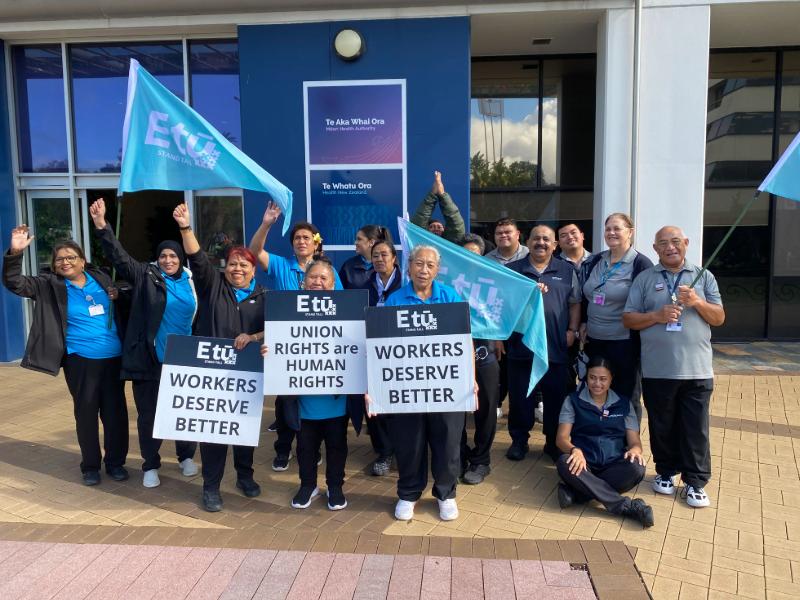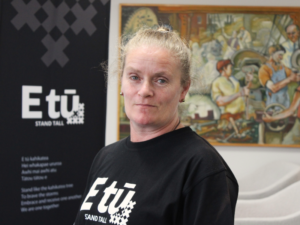From Northland to Invercargill, hospitals are running 24/7 to care for our communities. Behind every ward, theatre, and waiting room, E tū members are there, doing essential jobs that often go unseen. E tū represents cleaners, laundry workers, drivers, café workers, hospital supporters, security guards, kitchen staff, orderlies, multi skilled workers, and trades and maintenance workers. Whether they’re employed directly by Te Whatu Ora or through contractors, or working in private hospitals, our members are keeping the country’s health system ticking. E tū has a proud history of organising hospital workers and winning real improvements. Today, we continue that fight for respect, recognition, and decent pay. Right now, the Government seems determined to cut costs no matter the consequences. They say “frontline” workers are safe, but in public health every worker is on the frontline. False economies are being made across the system, with services contracted out to companies whose first priority is private profit. Bringing these services back in-house would save money and deliver better care. But that alone is not enough – we also need a Government that is willing to invest in strong, well-resourced public health services for everyone.

What E tū members do in hospitals
Cleaners: Infection prevention starts here
Hospital cleaners do far more than mop floors – they’re the frontline defence against disease. Every surface wiped, every room sanitised, is part of the infection control system that protects patients, staff, and visitors. It’s physically demanding work, often with tight timeframes and high standards, and it’s absolutely critical.
Security: Managing risk and supporting care
Hospital security workers deal with it all: patients in crisis, distressed whānau, alcohol-affected visitors, and sometimes outright violence. They are trained to de-escalate and support clinical staff, often in high-pressure situations. But too often, they’re treated like a second thought in the system, especially when they’re employed by private contractors.
Kitchen staff: Keeping patients nourished
A good recovery starts with good food. Kitchen staff prepare hundreds of meals a day, tailored to the needs of each patient. From special diets to allergen management, this is skilled work. With staffing shortages, kitchen teams are often stretched thin.
Orderlies: The hospital’s all-rounders
Need to get a patient to surgery? Need equipment moved between wards or supplies delivered during a night shift? Orderlies are the ones who make it happen. They know every corner of the hospital and are often the first to step in when something unexpected is needed. It’s a role that requires strength, stamina, and compassion.
Maintenance workers: Keeping systems alive
Hospitals rely on countless machines, systems, and structures, and maintenance workers keep them running. From power and plumbing to life support systems and fire safety, their work literally keeps people alive. Often working behind the scenes, they respond quickly when things go wrong and prevent breakdowns before they happen.

Karena Kelland
Public and Commercial Services
Industry Council Convenor
I work in the kitchen at Southern Hospital, doing everything from supervising shifts to managing stores, cleaning, and processing patient menus. The menu processing is a big part of making sure patients get the right meals, with adjustments for allergies, dietitian instructions, or changes in appetite. If someone’s not well and only wants a light meal, like two soups, they shouldn’t be given a full tray. It’s about making sure people feel looked after, even from the kitchen side. We’ve been employed by Compass Group since 2015, when we were contracted out. It did change things. We’re still treated as part of the team – the nurses still ring the kitchen like they always did – but sometimes it feels like I’m just a number to Compass, not a person. You see the difference contracting makes in simple things like PPE for security. Directly employed staff might have proper safety boots, while contractors are in gym shoes. That kind of thing really shows up in a hospital. But what really makes a difference is how underfunded the system is overall. We’ve had lockdowns where there wasn’t enough security on site. We’re short-staffed across departments. When we were directly employed, if something was needed to support a patient properly, we could usually get it. Now we can only work with what we’re given. I want people at our hospitals to know that we’re all in the same boat. Just because one round of bargaining is tough doesn’t mean the next one will be. We’ve recently won things like the Living Wage, and we’ve got solid terms and conditions – time and a half on weekends, double time on public holidays. It’s not perfect, but it’s a lot better than it was. As long as we stick together as union members, not just as fee payers, we can keep making progress.
